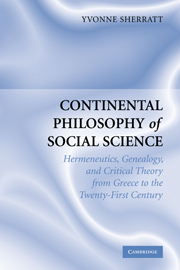Book contents
- Frontmatter
- Contents
- Preface
- Continental Philosophy of Social Science
- Introduction
- PART I THE TRADITION OF HERMENEUTICS
- Introduction
- 1 Ancient Hermeneutics
- 2 Biblical Hermeneutics
- 3 German Philosophical Hermeneutics: Enlightenment and Romanticism
- 4 German Philosophical Hermeneutics: Phenomenology and Existentialism
- 5 Continental Philosophical Hermeneutics Post War
- PART II THE TRADITION OF GENEALOGY
- PART III CRITICAL THEORY
- Conclusion
- Bibliography
- Index
4 - German Philosophical Hermeneutics: Phenomenology and Existentialism
Published online by Cambridge University Press: 23 November 2009
- Frontmatter
- Contents
- Preface
- Continental Philosophy of Social Science
- Introduction
- PART I THE TRADITION OF HERMENEUTICS
- Introduction
- 1 Ancient Hermeneutics
- 2 Biblical Hermeneutics
- 3 German Philosophical Hermeneutics: Enlightenment and Romanticism
- 4 German Philosophical Hermeneutics: Phenomenology and Existentialism
- 5 Continental Philosophical Hermeneutics Post War
- PART II THE TRADITION OF GENEALOGY
- PART III CRITICAL THEORY
- Conclusion
- Bibliography
- Index
Summary
PHENOMENOLOGY AND EXISTENTIALISM
In this section of our study we turn our attention to two eminent and quite complex strands of philosophy, both of which exerted an enormous grip upon hermeneutics. With the advent of phenomenology and existentialism we witness a wholly new shift in interpretation from issues about its practice to deeper underlying concerns about the nature of understanding itself. Although both Enlightenment and Romantic hermeneuticists discussed how we come to comprehend in the first place, and both provided analyses of the linguistic and historical components to this, neither tradition perhaps went quite as far as these two new ‘schools’ of philosophy. Moreover, Heidegger, actually turned his concern almost entirely towards a philosophy of interpretation and understanding whereas issues of exegetical practice all but faded from sight.
Husserl
Edmund Husserl, born in 1859, is the German philosopher credited as the founding father of phenomenology. He was born in what is now part of the Czech republic, and studied science and philosophy at Leipzig, mathematics and philosophy at Berlin and continued with philosophy and indeed psychology at Vienna and Halle. He taught at many of Germany's major universities until a few years before his death in 1938. Being of Jewish descent, his many papers were in danger from the Nazi regime, and were saved posthumously and now exist in a special archive in Louvain.
Of his many philosophical works, the most ground breaking was his early thesis Logical Investigations, 1900–01, in which he delivers his phenomenology.
- Type
- Chapter
- Information
- Continental Philosophy of Social Science , pp. 74 - 84Publisher: Cambridge University PressPrint publication year: 2005



